
Transitions Online_Around the Bloc-Foreign Money Scopes Out New Mongolian PM
Can tough-talking, Harley-riding Khurelsukh ensure stability and a coherent economic policy?
More...We kindly inform you that, as long as the subject affiliation of our 300.000+ articles is in progress, you might get unsufficient or no results on your third level or second level search. In this case, please broaden your search criteria.

Can tough-talking, Harley-riding Khurelsukh ensure stability and a coherent economic policy?
More...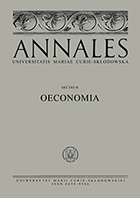
In most countries, a progressive tax is levied on the income of individuals. This article addresses the different design of a progressive tax scale taking into account the issue of the so-called tax bubbles that constitute an increased MTR. This feature of the tax function is a result of the exclusion of the high income taxpayers from the basic allowance or reduced tax rates. As shown in the article, this may lead to a higher tax burden under the joint taxation compared to the separate taxation. The analysis refers to the tax scales in Germany, Poland, the UK and the USA.
More...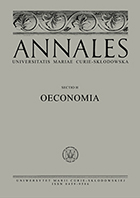
Fundamental indexing on the fixed income market is an alternative to traditional – using market capitalisation – method of weighting bonds in the index portfolio. It involves the determination of weights for individual debt securities based on fundamental factors that show the potential ability to service debt and creditworthiness of issuers – companies or states. Indices of this kind have been running since recently and are used by comparatively few financial institutions, but their significance is expected to grow because – as the research shows – they generally offer higher returns and risk-adjusted performance
More...
There are different systems of VAT deductibility, in case of purchase or production of capital goods, designed to safeguard tax neutrality. The systems, determined by the intended purpose of the good, have various consequences for finances of enterprises. The article aims at identifying and analysing of the systems of VAT deductibility as regards expenditure on purchase or production of capital goods with the assessment of its impact on finances of enterprises.
More...
Belarus relies on Russian energy, but economic factors argue against shipping its oil products via Russian ports.
More...
The Eurozone crisis has had a profound impact on representative democracy in Europe. On the one hand, the European Parliament has been largely marginalised in the area of the European Union’s economic governance; on the other hand, core competences of national parliaments have also been challenged by the executive-driven reforms. The crisis has also led to a differentiation in the position and strength of national legislatures and caused an unprecedented asymmetry between parliaments of the Eurozone. The main dividing line is the ‘status’ of debtor or creditor states. The biggest winner in securing its powers seems to be the German Bundestag, which owes its position to a series of judgements of the German Federal Constitutional Court. A growing asymmetry between national parliaments brings a new dimension of the democratic deficit: the strengthening of the Bundestag’s oversight competences is not a ‘win-win situation’, which contributes to the strengthening of parliamentary democracy in Europe because it brings serious ‘side-effects’: it undermines the position and competences of debtor states’ parliaments. This creates tensions between democracies with respect to two core components of democracy: congruence and accountability, and thus poses new challenges for democratic legitimacy at national and European levels. The increasing differentiation and asymmetry between parliaments create the effect of domination and deepen the democratic deficit, not only at the European level but also in some member states. The question whether and how these tensions can be alleviated remains open. Recently, one of the most frequently discussed ideas to address the democratic deficit problem has been the one of a strengthened interparliamentary cooperation which, however, seems to bring as many hopes as challenges.
More...
The objective of this study is to discuss the principles of the lump-sum personal income tax applied in Poland in the years 1950–1997. The analysis of the aforesaid historical legal constructs could, to a certain extent, constitute a benchmark for legislators and reformists of the current Polish personal income tax and, in practice, appear (at least for certain groups of taxpayers) to be an attractive and alternative form of income burden.
More...
Government badly needs funds for a huge hydropower project it hopes will end the misery of winter blackouts.
More...
The main aim of this article is to classify and characterise the major factors that have influence on the choice of method of the determination of the tax base by means of assessment. The author lists four factors and assesses how each of these affects the result of the determination of the tax base by means of assessment. Their application should lead to the obtaining result of value of tax base similar to its actual size. Not all of these factors properly realises this objective, which is also a subject of analysis and evaluation.
More...
Pursuant to article 9 clause 2 of Ordinance of the President of the Republic of Poland on Administrative Procedure of 1928, persons which possessed so-called legal interest in the case, were entitled to participate in the administrative procedure as a party. Both in procedure initiated by the authority ex officio and initiated on their own demand. The essential and still unsettled question of this construction is: who is authorised by the law to establish the existence of that legal interest, and consequently who decides on the admission of the applicant to the proceeding. This issue has been transferred to the Tax Code of 1997 with the implementation of that scheme, without taking into consideration the legal specificity of the tax assessment, especially self-assessment, to the tax procedure. Furthemore, pursuant to the ontological system, presented by Roman Ingarden in his work Controversy over the Existence of the World, an object which is the initiation of the procedure is an event, not a thing, processes, purely intentional object or an idea. Tax procedural law does not distinguish and name various types of objects properly, which causes serious problems as to legal interpretation. The aim of this work is to give some basic legal and philosophical directions for the reconstruction of the institution of the tax procedure initiation.
More...
The article addresses the consequence of joint taxation and the rules of several liability for tax obligations. In addition it addresses the issue of the rights relating to the conduct of tax payment enforcement if only one spouse is liable. Issuing enforcement orders against one or both spouses is also discussed. The article concludes that joint assessment entails, not only, benefits but also threats for spouses carrying out an economic activity.
More...
Experts say high growth rates on the back of government handouts are unsustainable.
More...
Their ties have been strained for much of the quarter-century since independence, but Tajikistan and Uzbekistan are moving swiftly to patch things up.
More...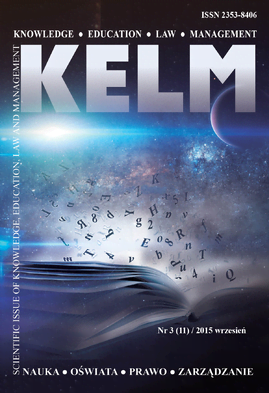
The article deals with the issue of public credit and its inclusion into the financial system, research institutes correlation public credit and public debt.
More...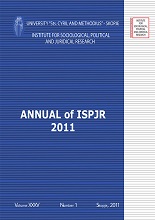
Corporate social responsibility is defined with the European document of 2006 (Implementing the Partnership for Growth and Jobs: Making Europe a Pole of Excellence on CSR), in which corporate social responsibility is a concept by which companies integrate care for the community and environment into their business activities and their interdependence with other stakeholders on a voluntary basis. This definition implies that in order for business entities to be socially responsible they have to act over the existing legal framework to meet certain social requirements. By embracing the principles of corporate social responsibility, it is expected that business entities together with the other stakeholders would have an agreement on economic, social and environmental objectives. The aim of the Lisbon Strategy for Growth and Jobs of the EU is to create a business environment that will maintain the sustainable development of society as a whole and to presents an opportunity for promotion of initiatives for development of civil society. Corporate social responsibility is a complex phenomenon whose far-reaching implications contribute to the development of such a business environment. The text will make a comprehensive analysis of European policy, which encourages the practice of corporate social responsibility in terms of social expectations, the expectations of consumers, investors, community and NGOs. For competitive functioning of Macedonian companies on the European market, making a series of bureaucratic, financial and legal settings will not be enough. There is a need for building a corporate identity, or more specifically, improvement of one aspect that has been largely neglected, and this is promoting the aspect of corporate social responsibility that should target the socio-economic challenges and integrate them into the business practice. Building a corporate identity that is perceived mainly through the corporate brand or brands should consider the corporate communication, corporate image and corporate reputation. Corporate identity actually represents the reality and uniqueness of a company.
More...
In the paper there are presented current problems concerning rules of limiting of the debts in local government. Foreshadowed tendencies over the recent years evidence gradual enlarging of the debts in local government. This produces the necessity of the new look on problems of qualifying of maximum safe limits of the debts. Prepared changes in low regulations in this range are an advance in the thorough reconstruction of the financial system of local government, especially in debt limitation.
More...
The article presents problems of the maintenance of the financial liquidity conditioned of the crisis. The author presents internal and external factors formative the financial liquidity. In the article, there are presented methods of the measurement of the financial liquidity.
More...
The article presents problems (trials) of supporting processes and the help given to enterprises by local government. One introduced main areas and directions of the help and the support and their aims, in this first of all from the point of view of goals of local government. Simultaneously one tried to evidence negative and affirmative aspects of the help and the support for enterprises.
More...
The result of policy of innovative organization is growth of its competitiveness and at the same growth of its market value (Business Value). Larger intellectual capital transfers into higher BV and at the same higher profits of shareholders’ and higher salaries of employees. Obtaining the higher value of intellectual capital is possible only with the usage of the suitable policy of innovative organization. The key factors in achieving high intellectual value are: leader and its position within the organization as well as the culture of organization. This factors are highly evaluated by the senior management. Such factors play essential part in obtainment the high-level of intellectual capital how: leader and his position at organization as well as the culture of organization. Higher manager personnel estimates factors these high. The part of system of economic justification in the creation of capital intellectual it is higher estimated by workers directly executive them and operating managers than by managers of higher management.
More...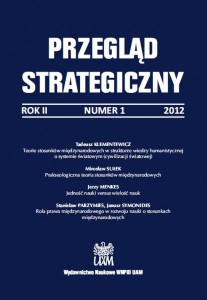
Next to oil and gas there are which have increasing importance for industrial development – rare earth elements. Without them, much of the world’s modern technology would be vastly different and many applications would not be possible. They are key component of in a large assortment of advanced military and civilian technologies and key to the emergence of green technology such as the new generation of wind powered turbines and plug-in hybrid vehicles. There are 17 rare earth elements which moderately are abundant in the earth’s crust, some even more abundant than copper, lead, gold, and platinum. Although they are not concentrated enough to make them easily exploitable economically. 97 percent of the world’s rare earth elements are produced in China. Increasing global demand and Chinese reductions in export quotas over the past six years have led to international concerns about future supply shortages. China’s request for rare earths is also growing, what causes even more problems for importers of these resources. Even those countries which were largely self-sufficient in these critical materials over the past decade have become dependent upon imports from Beijing. In addition, this monopoly over rare earths has led to fears of China using its dominance as leverage to influence other nations’ foreign policies. Considering example of Japan, these anxieties are not groundless. This paper is designed to present te phenomenon of rare earth elements and their importance for international economy. It also explores ways of facing Chinese monopoly by other states.
More...